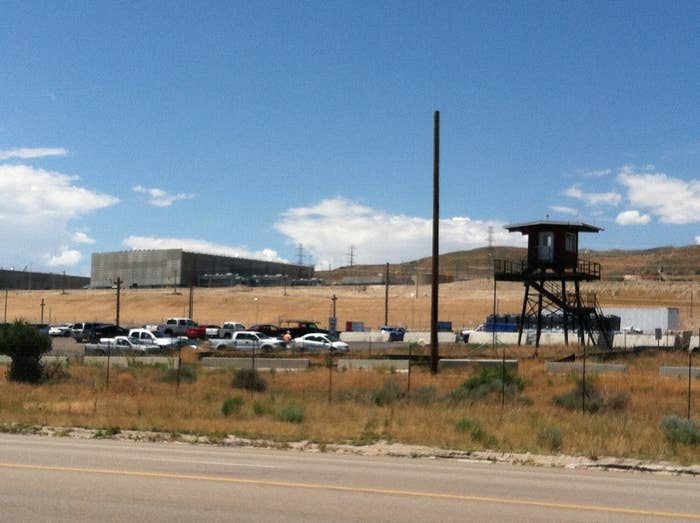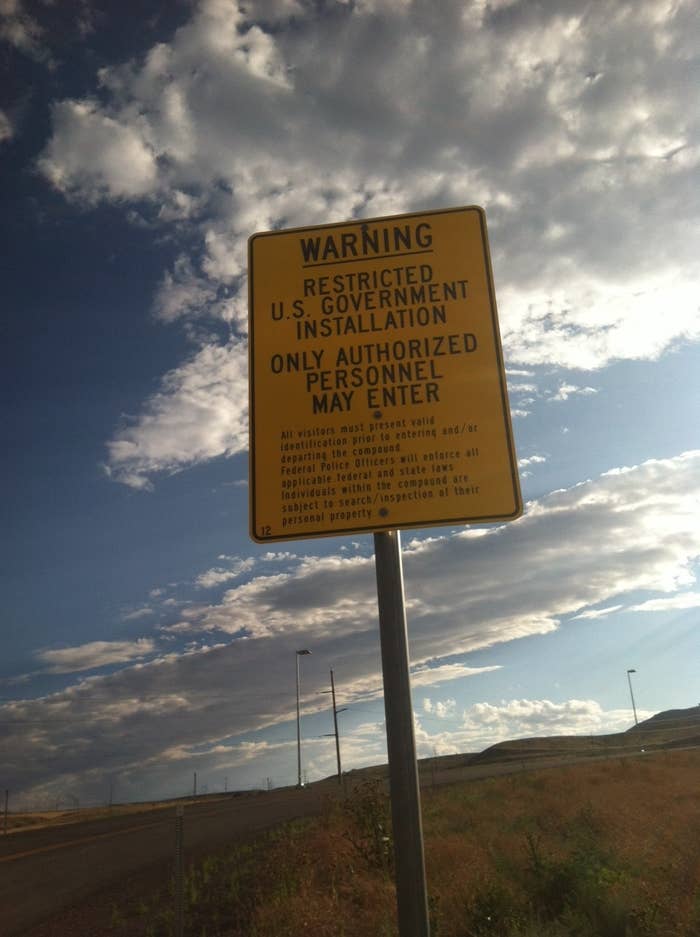
"Excuse me, what are you doing here?" It was a fair question. But the next one confused me.
"Why do you have a backpack?" Did he think I was a hiker that took the wrong path? I often carry a backpack. Why would he care?
And then, of course, it dawned on me. Everything's a potential threat when you're on private military land, home to the National Security Agency's massive data processing center. Which is exactly where I was, with my bag, looking around.
He was an NSA police officer, in an all-black uniform with a shiny badge, dark shades, and an NSA baseball cap. His white SUV had red and blue flashing LED lights in the back side window.
Who was I? Where was I from? Where was I going? What was I doing there? Didn't I know that I wasn't supposed to be there? The questions went on.
He asked me if I had any weapons or recording equipment. He asked me to give him my ID, put down my bag, and step away from it while he ran my information.
I stood there staring up in the blindingly brilliant sunlight at the gray nondescript box-shaped buildings, which contain the massive server farms containing personal information of U.S. citizens, myself likely included. The site itself is the physical manifestation of extreme secrecy, and is at the geographic center of an international scandal. Yet, there I was, standing in the parking lot. Odd, I thought, how the buildings look a bit like oversized computer servers themselves.

The Utah Data Center is located in a no-man's-land between two small towns, Bluffdale and Lehi, 25 miles south of Salt Lake City. It's an area filled with Latter-day Saints churches, sage brush, huge desert skies, pre-fab houses, and lots of electric wires. There is empty land all around the buildings. "I always build everything expandable,'' Harvey Davis, NSA director of installations and logistics, told the local Salt Lake Tribune newspaper a few weeks ago.
Across from the facility is a National Guard Army base. Down the road are big box stores, fast-food restaurants, and one of the nation's largest dinosaur museums.
Driving along the flat roads in the valley surrounded by mountains, you can see the center from miles away.
I had put "Utah Data Center" in my GPS, which, to my surprise, worked instantly. At the traffic light, right before the turn into the facility, there is a small yellow sign reading "No Outlet" pointing to the left. I had two options: Drive straight ahead past the facility, or turn left up toward the buildings. I, of course, being curious, turned left.
I drove down the newly paved road, which felt like so many driveways up to corporate campuses across America, curving up the hill. There was no gate. No sign announcing the NSA.
Halfway up the hill there was a yellow sign on the side of the road, not much bigger than a speed limit sign, telling visitors that they can't be there. But that's it. No gate to open, no barrier to pass. Just a turn to take from a public road.
I kept on going.
Up the top of the hill was a tiny building, with big windows, which I assumed to be a security gate. No one was there; it's Sunday evening and this is Mormon country. There was a sign with the NSA and National Intelligence Agency seals.
I parked in the corner of the parking lot and got out. There were about 20 other cars — mostly bland sedans and pickups. I noticed one white van with a ladder on it and a lone Mercedes. A guy in a pickup drove into the parking lot. It didn't seem like there was much action.
I tried to take a photo of one of the data halls further up the hill, but the evening light was at exactly the wrong angle. I walked across the parking lot to see what I could find.
That was when, a moment too late, I noticed a police officer in a white SUV with the motor running. He noticed me too. And that's when the questions began.
He was suspicious. He wasn't about to buy that I was just passing through, or seeing the sights. But of course — that's his job. While he was running my information, another NSA police officer pulled up in a white SUV, with the same flashing lights. He guarded me, with questions of his own.
He asked me what I did for a living. I told them I write for a website, BuzzFeed. He had never heard of it. He wanted to know if it was family friendly. I had a feeling he thought it was a porn site.
"I didn't realize where I was going. I'm sorry for the misunderstanding," I said.
"I don't think this is a misunderstanding," he responded. "I think you know exactly where you are."
And of course I did. It was just a tiny example of the larger game we are all playing with the NSA. We all feel like we know they're spying on us. The evidence is there, and mounting. With our ability to see these walls but not beyond them, though, and the agency's increasingly unlikely denials of surveillance overreach, it makes the game feel stacked.
"Do you have a criminal record?" he wanted to know. I didn't. "Well, you are illegally trespassing on military property. You could end up with a federal record."
If I was more experienced with Utah's trespassing laws, and these men's jurisdiction, I might have challenged them on that, and more. But I just wanted to get out of there.
"When you are traveling in an area you don't know, you should really pay more attention to the signs," he said. I apologized.
The officer asked for my car keys and looked through the car on the other side of the parking lot, telling me to stay put. They wrote down the license, registration information, and asked me for the VIN number. I explained it was a rental.
The two officers went back over by the SUVs and discussed the situation. I was lucky.
"I'm going to give you the spiel I give everyone," said the first officer. "You are trespassing on military property. You are breaking the law by being here. If you come back, you will find yourself down at the federal courthouse. Get in your car and leave."
So I did.
Ed note, 7/16: Earlier this year, Forbes writer Kashmir Hill made a similar pilgrimage. Read her story here.
